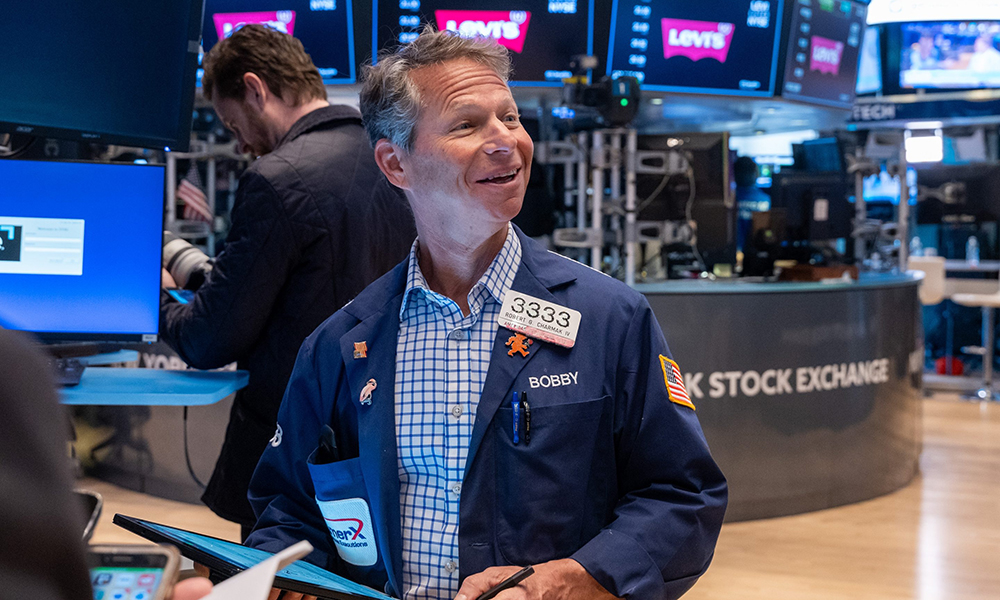
隨著中東地區以色列和伊朗的沖突升級,而且事實證明美國國內的通脹比預想的更難控制,至少到目前為止,美國股市終于停止了大幅上漲。從去年10月底到今年3月28日,標普500指數暴漲超過27%,但在過去兩周半已經下跌了約4%。
但投資管理與市場研究公司Main Street Research的創始人兼首席投資官詹姆斯·德默特認為,這只是牛市的臨時盤整,在未來十年仍會給投資者帶來回報。Main Street Research管理的資產規模高達20億美元。
德默特在金融行業從業35年,曾出版過三本投資類圖書,包括最近出版的《華爾街經驗》(Wall Street Lessons)。他解釋稱,他認為美股連續近六個月上漲之后,“肯定會出現回調”,但這并不會改變他的長期觀點,即在未來幾年,人工智能會推動收益增長。
他通過電子郵件告訴《財富》雜志:“雖然目前媒體報道的都是可怕的新聞,但我們認為我們已經進入了在人工智能驅動下的新牛市,因此對于本次股市回調,我們持買入態度。新牛市可能再持續七至九年,因為人工智能預計將大幅提升各行各業的生產力,這將增加企業收益。”
人工智能驅動收益增長,直面地緣政治風險
關于人工智能繁榮,大多數專業投資者從最開始就在考慮一個主要問題:近期人工智能的熱度是過度炒作還是合理現象?辯論雙方陣營依舊有一些主流的聲音。
德默特認為,未來幾年,人工智能的崛起將幫助推動公司收益增長,投資者不應該因為近期的地緣政治風險問題而錯過良機。他認為:“在這個令人激動的由人工智能驅動的新商業周期,投資者必須避免沖動和對中東沖突等事件作出過激反應,而是要制定耐心的、反應積極的和機會主義的策略,以應對這些事件。”
一些統計數據證明人工智能具有削減成本和提高生產力的能力,德默特認為這會增加公司的收益。高盛(Goldman Sachs)的研究顯示,未來十年,人工智能可使全球GDP增長7萬億美元。麥肯錫(McKinsey)發現,生成式人工智能系統將使目前占用上班族70%的時間的任務,完全自動化。
從美國金融業巨頭到拉丁美洲電信公司,全世界的公司都在利用人工智能降低人工成本,提高生產力,尤其是在客戶服務和市場營銷方面。不只是大公司在努力抓住人工智能繁榮所帶來的機遇。以Batesville Tool & Die公司為例。該公司是來自印第安納州貝茨維爾的一家小型制造公司,主要生產精密金屬沖壓部件。據美聯社今年早些時候的報道,由于Batesville Tool & Die地處一個小城鎮,因此多年來一直無法吸引人才,使公司出現了嚴重的問題。于是,公司管理層決定投資可使用人工智能“看到”周圍的世界和模仿人類員工的機器人,不僅解決了人手不足的問題,還提高了公司的生產力。
德默特和其他看好人工智能的投資者認為,同樣的事情正在世界各地上演,而且這些創新在未來幾年將提高公司的收益。但這位資深投資者依舊警告,短期內股市可能經歷陣痛,尤其是如果中東局勢升級,“該地區的其他勢力”卷入其中。他說道:“股市回調的量級很大程度上取決于中東局勢和未來走向。” 他警告“當前的緊張局勢一旦升級,就會導致股市進一步下跌”。
Bowersock Capital Partners公司CEO兼創始合伙人艾米莉·鮑爾索克·希爾本周也通過電子郵件對《財富》雜志表示“地緣政治風險異常升高,而且風險可能持續存在”。這意味著,投資者應該保持警惕。盡管面臨中東戰爭的威脅,還有更高的通脹和更少的降息次數,但她也相信牛市“不會受到影響”。而且對于希望抓住人工智能繁榮的投資者,Bowersock Hill提供了許多想法。
她說道:“我們看好那些將從人工智能中受益,但股價尚未體現出相關長期生產力增益的行業,包括醫療保健和工業等。我們還看好科技行業內能夠拓展或支持人工智能應用的與人工智能關系密切的公司。”(財富中文網)
翻譯:劉進龍
審校:汪皓
隨著中東地區以色列和伊朗的沖突升級,而且事實證明美國國內的通脹比預想的更難控制,至少到目前為止,美國股市終于停止了大幅上漲。從去年10月底到今年3月28日,標普500指數暴漲超過27%,但在過去兩周半已經下跌了約4%。
但投資管理與市場研究公司Main Street Research的創始人兼首席投資官詹姆斯·德默特認為,這只是牛市的臨時盤整,在未來十年仍會給投資者帶來回報。Main Street Research管理的資產規模高達20億美元。
德默特在金融行業從業35年,曾出版過三本投資類圖書,包括最近出版的《華爾街經驗》(Wall Street Lessons)。他解釋稱,他認為美股連續近六個月上漲之后,“肯定會出現回調”,但這并不會改變他的長期觀點,即在未來幾年,人工智能會推動收益增長。
他通過電子郵件告訴《財富》雜志:“雖然目前媒體報道的都是可怕的新聞,但我們認為我們已經進入了在人工智能驅動下的新牛市,因此對于本次股市回調,我們持買入態度。新牛市可能再持續七至九年,因為人工智能預計將大幅提升各行各業的生產力,這將增加企業收益。”
人工智能驅動收益增長,直面地緣政治風險
關于人工智能繁榮,大多數專業投資者從最開始就在考慮一個主要問題:近期人工智能的熱度是過度炒作還是合理現象?辯論雙方陣營依舊有一些主流的聲音。
德默特認為,未來幾年,人工智能的崛起將幫助推動公司收益增長,投資者不應該因為近期的地緣政治風險問題而錯過良機。他認為:“在這個令人激動的由人工智能驅動的新商業周期,投資者必須避免沖動和對中東沖突等事件作出過激反應,而是要制定耐心的、反應積極的和機會主義的策略,以應對這些事件。”
一些統計數據證明人工智能具有削減成本和提高生產力的能力,德默特認為這會增加公司的收益。高盛(Goldman Sachs)的研究顯示,未來十年,人工智能可使全球GDP增長7萬億美元。麥肯錫(McKinsey)發現,生成式人工智能系統將使目前占用上班族70%的時間的任務,完全自動化。
從美國金融業巨頭到拉丁美洲電信公司,全世界的公司都在利用人工智能降低人工成本,提高生產力,尤其是在客戶服務和市場營銷方面。不只是大公司在努力抓住人工智能繁榮所帶來的機遇。以Batesville Tool & Die公司為例。該公司是來自印第安納州貝茨維爾的一家小型制造公司,主要生產精密金屬沖壓部件。據美聯社今年早些時候的報道,由于Batesville Tool & Die地處一個小城鎮,因此多年來一直無法吸引人才,使公司出現了嚴重的問題。于是,公司管理層決定投資可使用人工智能“看到”周圍的世界和模仿人類員工的機器人,不僅解決了人手不足的問題,還提高了公司的生產力。
德默特和其他看好人工智能的投資者認為,同樣的事情正在世界各地上演,而且這些創新在未來幾年將提高公司的收益。但這位資深投資者依舊警告,短期內股市可能經歷陣痛,尤其是如果中東局勢升級,“該地區的其他勢力”卷入其中。他說道:“股市回調的量級很大程度上取決于中東局勢和未來走向。” 他警告“當前的緊張局勢一旦升級,就會導致股市進一步下跌”。
Bowersock Capital Partners公司CEO兼創始合伙人艾米莉·鮑爾索克·希爾本周也通過電子郵件對《財富》雜志表示“地緣政治風險異常升高,而且風險可能持續存在”。這意味著,投資者應該保持警惕。盡管面臨中東戰爭的威脅,還有更高的通脹和更少的降息次數,但她也相信牛市“不會受到影響”。而且對于希望抓住人工智能繁榮的投資者,Bowersock Hill提供了許多想法。
她說道:“我們看好那些將從人工智能中受益,但股價尚未體現出相關長期生產力增益的行業,包括醫療保健和工業等。我們還看好科技行業內能夠拓展或支持人工智能應用的與人工智能關系密切的公司。”(財富中文網)
翻譯:劉進龍
審校:汪皓
With the conflict between Israel and Iran escalating in the Middle East, and inflation proving more difficult to tame than expected domestically, the stock market’s meteoric rise has finally been halted—at least for now. After surging more than 27% between the end of last October and March 28, the S&P 500 has dropped roughly 4% over the past two and a half weeks.
But this is just a temporary correction in a bull market that’s set to reward investors for nearly a decade, argues James Demmert, founder and chief investment officer of Main Street Research, an investment management and market research firm with $2 billion in assets under management.
Demmert, who has spent 35 years in the financial industry and authored three books on investing, including his most recent Wall Street Lessons, explained that he believes stocks were “due for a pullback” after rising in nearly a straight line for six months, but that doesn’t change his long-term thesis that AI will drive earnings growth for years to come.
“We are buyers of this stock market correction because while the headlines are scary right now, we believe we have entered a new bull market led by the power of artificial intelligence,” he told Fortune via email. “This new bull market can last for another seven to nine years, as AI is expected to drive significant productivity gains for companies across the board, which will strengthen corporate earnings.”
An AI-driven earnings boom—with geopolitical risks
When it comes to the AI boom, the main question for most professional investors has been clear from the start: Is the near-term hype overly enthusiastic, or is it warranted? And there are still leading voices on both sides of that debate.
Still, for Demmert, the rise of AI will help drive corporate earnings in the coming years—and investors shouldn’t miss out due to near-term geopolitical issues. “During this exciting new business cycle that will be driven by artificial intelligence, investors must avoid being impulsive and reactive to events such as the Mideast conflict and instead institute a strategy that is patient, responsive, and opportunistic as these types of events unfold,” he argued.
There are some statistics that back up the cost-cutting and productivity-enhancing abilities of AI that Demmert believes will lift corporate earnings. AI could increase global GDP by $7 trillion over the next decade, according to a study from Goldman Sachs. And McKinsey found that generative AI systems could eventually automate tasks that currently take up 70% of workers’ time on the job.
From U.S. financial giants to Latin American telecoms, companies worldwide are already using AI to reduce labor costs and improve productivity, particularly when it comes to customer service and marketing. But it’s not just major corporations that are taking advantage of the AI boom. Take the example of Batesville Tool & Die, a small manufacturing company in Batesville, Ind., that makes precision metal stamping components. As the Associated Press reported earlier this year, Batesville Tool & Die struggled to attract talent to its small town for years, leading to serious issues for the company. Then management decided to invest in a robot that used AI to “see” the world and mimic human workers, which ended the talent crunch and increased the company’s productivity.
Demmert and other AI bulls believe stories like this are happening all over the world, and those innovations will serve to boost corporate earnings for years to come. Still, the veteran investor warned that stocks may be in for some pain in the near term, particularly if tensions in the Middle East cascade and “other players in the region” get involved. “The magnitude of this stock market correction will depend in large part on what’s going on in the Middle East and how things play out from here,” he said, warning that “any escalation of the current tensions would likely cause a further drop in stocks.”
Emily Bowersock Hill, CEO and founding partner of Bowersock Capital Partners, also told Fortune via email this week that “geopolitical risks are unusually elevated and are likely to remain so.” Meaning: Investors should be cautious. But despite the threat of war in the Middle East—as well as higher inflation and fewer rate cuts—she, too, believes the bull market “remains intact.” And Bowersock Hill has a few ideas for investors looking to take advantage of the AI boom as well.
“We like sectors that will benefit from AI but have yet to price in the associated long-term productivity gains, including health care and industrials,” she said. “We also like AI-adjacent names within the technology sector that magnify or enable AI’s use.”






